No matter where one lives, there’s always going to be certain things that “grinds one’s gears” about living conditions, people, lifestyles or simply parrying the “slings and arrows’ that come one’s way in dealing with the mundane on a daily basis.
For your delectation, here are ten things I won’t miss about China. They aren’t in any particular order, with perhaps what I listed as “number one” which ironically, wasn’t on this list when I began writing it some weeks ago. Also, there are more than ten items I could write about. I could list lots of little annoying things such as the occasional use of the streets as a public toilet or the tendency of men to gratuitously and loudly spit in public or even how annoying riding an elevator can be…Oh, wait, that did make my list. But it speaks to how much I really did enjoy my three years in China that there were really so few things that did “grind my gears.” I know a couple of fellow western teachers who couldn’t even last their one year contract to teach in China because they simply could not cope with the changes in their lives or adapt well to a foreign environment.
And of course, I could write a small tome about things I am unhappy with about America so I’m not “picking” on China, per se. There is no doubt I could come up with a far more expansive list of negative things about living in America. The main one rhymes with “dump” although a dump is a whole lot nicer in every way imaginable. I know what you’re thinking, ‘there he goes again with his ‘ax to grind’ about the Mango Mussolini.” Well I say: “Cut me some slack, Jack! This IS a list about dislikes.” And here’s a joke I just made up, given the news out of Paris. “Donald Trump is to America what attic renovations are (were) to Notre-Dame Cathedral.” Ba-dump!
Number ten- Elevators: “Seriously, elevators, Brian?” How could those possibly offend, you ask? Who, I ask, who likes being squeezed, cheek to jowl with complete strangers in a six-foot square box for what can seem like forever, staring at either wall adverts, the floor numbers on the panel or simply straight ahead while feeling the piercing stare of people as they contemplate you as an object of curiosity? And that’s actually the least stressful part of the experience. The worst part are the lobbies. Any lobby. Remember, this is China. Nothing here occurs on a small scale. Most of the time, while waiting for an elevator, there are masses of people gathering and multiplying exponentially as you stare in disbelief at the four or six elevators all simultaneously going in the wrong direction you need them to go and even though the experience may last a minute or two (but like waiting for traffic lights, seems interminable) that’s time enough for a lobby to fill to overflowing. Then, when the elevator doors open, the inevitable collision of two groups, neither intent on yielding to the other. If you’re not Chinese you probably initially aren’t inclined to join the fray. After all, who wants to be a human billiard ball? By not flinging yourself into an elevator, you do maintain your dignity. And it’s also true you miss being packed in, sardine-like. But then you wait for the next car only to confront the exact same situation one or two minutes later because the lobby in that time has once again, overflowed with people. “Lather, rinse, repeat…”
At some point, you either decide to take the stairs (which I’ve done numerous times, in many buildings) or you realize that elevator exasperation is just part of the urban landscape in large Chinese cities. So you suck it up and merely “grin and bear it.” (There are simply times when dignity is overrated.) As bad as it is here in Xi’an, it was far more stressful in Beijing because there are far more people. So there’s that.
Oh, did I mention the times when there aren’t throngs of people to contend with, rather, people who upon entering or exiting elevators, stop dead at the threshold to read something on their phone? It’s not just elevators where this happens. Just about everywhere, people will simply stop to look at their phones to read messages. You have to be nimble to stop on a dime or scurry around to avoid a collision. Which brings me to Number 9…
Number nine- WeChat: WeChat (the social media app) is the single common denominator in China. Well, that and an obsession with food. Everyone and I mean everyone uses it. It’s ubiquity simply cannot be overstated. So, what’s the problem? People are so glued to their phones that they become completely unmoored from their surroundings. They appear completely oblivious or utterly indifferent to spatial awareness and as mentioned above, will stop dead in their tracks to check their phone, as if living in a city with more people than many small countries, there can’t possibly be someone trailing behind them closely: on the escalator, elevator, subway door entrance, at the cash register, etc, etc, ad nauseam. In other words, walking almost anywhere, at times, becomes a game of “human dodgeball.”
Number eight- Subways: Who says something can’t be a top ten thing you will and won’t miss, at the same time?
The subways in China are fantastic. Clean, efficient (you never wait more than 4 minutes for one to arrive) go most places you want to go (4 lines in Xi’an, 16 in Beijing) and dirt cheap. Unfortunately, most of the 13 million inhabitants of Xi’an, agree with me. I’ve had days off when I simply can’t get up the desire to leave my large personal bubble (my apartment) to go to the gym because that means fighting the crowds in the subway on both ends. Even though everything is automated and therefore, in theory, moves quickly, there are chokepoints. One is the security checkpoint at all stations. First, there may be long lines to battle. Then, you have to put your personal belongings through an X-ray machine and that inevitably creates a bottleneck. Sometimes, a security person also elects to check everyone with a handheld scanner. And we cannot forget the person in front of you who is carrying some type of container with liquid that must be handed over for inspection (even a store-bought bottle of water is inspected).
The other backups are at the entrance and exit turnstiles to pay (upon entering and exiting). There are phone apps that allow people to simply scan their phones to pay on both ends for their subway fare. In theory, that speeds things up, right? Except that oftentimes people are fumbling to find, launch and scan the app and of course, the scanner doesn’t always interface quickly and the whole thing quickly bogs down when someone in front of you (once again) stops dead to try and pay with their accursed phone. I use a subway fare card which the machine always reads quickly and with no problem. Again, people with their phones, driving me crazy.
The subway where I worked at Xiaozhai is a major transfer station and at peak hours the crowds are reminiscent of Times Square on New Year’s Eve- except more closely packed together. I’ve seen lines to enter this subway stop reaching out to the sidewalk in front of my office building which is two floors above the actual subway entrance. The authorities have actually closed the entrance to the station on occasions when the crush of people is just too great, forcing me to walk to the next station. Many times I’ve had to endure stadium-length lines to exit that subway (gnashing my teeth over the inevitable phone app hassle described above) just to go to work. (see photos below).
Number seven- The air quality: or lack thereof. Remember oxygen bars, circa 1990’s America? They were also a “thing” in Beijing at that time but I think they all went the way of fad diets (remember those?) for the same reason: they were a complete waste of time and money. Having said that, there are days in Xi’an, Bejing and just about any large city in China, when oxygen bars don’t sound like such a bad idea. Xi’an hasn’t been nearly as bad as Beijing was. So at least, there’s that.
I will never forget New Year’s day, 2017 when the Air Quality Index reading in Bejing went off the scale which tops out at 500. I elected to stay indoors that day. Click the link and you can see how bad the air was looking out my window. Thankfully, no day has been more polluted than that in Xi’an. For all that, I only once (in Beijing) wore a face mask. So many people wear masks, that going “maskless” almost marks my behavior as aberrant. But the one time I did it I felt ridiculous and haven’t worn one since. I take the long view about lung cancer. By the time I would get cancer from being exposed to air pollution in China, I will have died from something else. That’s actually quite comforting.
Number six- “Ren shan ren hai” (人山人海) Translation: “People mountain people sea” or simply put: lots of people…lots. I’ve said it before at various times in my blog postings “It’s crowded in China” Understatement? Oh, a tad…As I noted above in my elevator rant, I’ve had days off whereby I didn’t actually plan not to leave my apartment but as the day progressed the idea of wading into the crowds was just simply too much to contemplate. Enervation without actually becoming enervated. If that isn’t “a thing” it is now.
Xi’an’s metro population is 12 million人. It’s also called a “second-tier” city in China. The four “first-tier cities” are: Beijing, Shanghai, Guangzhou, and Shenzhen. Now those are big cities! Second-tier cities barely rate in China. And there are 29 of them! It’s worth pointing out that despite Xi’an’s second-rung status in China if it were in America it would be by far the largest city with three million more people than New York City.
All of this means that in many places around Xi’an there are vast numbers of people. At least where I live, in suburban Quijiang, it’s actually possible to walk down a sidewalk and it’s no more crowded than any city sidewalk in America. But that’s an exception. Go where there is shopping or anywhere near downtown and gird yourself for wall-to-wall people. It really can grind one down to face this unending sea of humanity, day in, day out. Having said that, people here largely seem unfazed. Why not? It’s what everyone here is used to. It’s like that old chestnut about “fish don’t notice they’re in water.” (see photos below).
Number five- Cigarette smoking: Like I have to explain that one.
Full disclosure: I smoked cigarettes in the 1970s. Everyone, it seems, did. I quit in 1980 when I moved to San Francisco. In my three years in China, I have had two cigarettes and one Cuban cigar while living in Beijing, which I wrote about here.
Fellow Americans…Remember “smoking” and “non-smoking” tables in restaurants and bars? Well, that’s “a thing” here. I compare it to “chlorinated” and non-chlorinated” parts of a swimming pool. Suffice to say that I abandoned my “cigarette-nazi” opposition about the time I moved to Beijing three years ago. Here, there’s no virtue in being against smoking or much sense in railing about it. It really is like emptying the ocean with a spoon.
I found this little nugget online that was dated three years ago: “China’s smoking population is said to have increased by 15 million during the past five years and now stands at 316 million, or nearly 30 percent of the population. More than 50.0 percent of men and 2.7 percent of women smoke.”
The number of smokers in China is equal to the population of America. Notice the enormous difference between men and women? It’s absolutely true. You rarely see women smoke and just walking around one would observe that about half the men do smoke. Add to that, the dreadful air quality and you have to wonder about male mortality rates here. The government owns a monopoly on tobacco production and makes over 1 trillion yuan from selling tobacco. I don’t see usage declining anytime soon. Not that it will impact me. I’m outta here. I don’t know if the incidence of smoking is any less in Vietnam but I don’t see how it could be any worse.
Number four- Traffic: As crazy as traffic is in Chinese cities I already know I will miss it when compared to what I experienced in HCMC. On the plus side, in HCMC all traffic is going in the same direction on any given street, unlike in China where traffic can come at you from directions you didn’t even know existed. Not only that, in HCMC the sidewalks generally aren’t used for motorized vehicles unlike in China where it’s all too easy to have a traffic accident… on the sidewalk. But once you get used to the flow of traffic in China, it’s actually not that hazardous walking and crossing streets. You just have to remember to always look both ways at all times even on the sidewalks. Traffic is aggravating here but after a couple of years, negotiating it without too much difficulty becomes second nature.
Number three- Chinese food: Say what? Particularly ironic as I have listed on my English First teacher bio placard for all to see, that Chinese is my favorite cuisine. I consider myself a “foodie” so I suppose a purist could fairly criticize me for favoring “American-Chinese food” plenty of which does not exist in Mainland China. “General Tso’s Chicken”? No such thing. Chop suey? Sweet and sour pork? You won’t find these on a menu in these parts. Moo shu isn’t at all what it’s like in San Francisco/LA. Fortune cookies at the end of a meal?…” surely you jest.” You will never even be given a pot of tea at the beginning of a meal- standard operating procedure in Chinese restaurants in America.
Chinese joke: “What has four legs but isn’t eaten in China? …A table.” Once you’ve lived here you get to appreciate the perspicacity of that joke. As in any culture, there are going to be flavors and foodstuffs that are simply too foreign for the “uninitiated” to consider eating. And even though I do consider myself a foodie, animal intestines, brains, scorpions on a stick and red ants are “comestibles” that I have issues with, to say the least. I don’t even mind the fiery spice of Szechwan cuisine which is usually turned up “to eleven.” My real issue is that many Chinese food dishes are “swimming” in oil. It’s difficult to eat healthy Chinese food in China especially if you can’t speak the language or read a menu. Even items such as soups are surprisingly and needlessly (in my opinion) subsumed in cooking oil. When I go out to dinner with friends, I always try to steer everyone to other cuisines such as burgers, Italian, Mexican. Having dissed Chinese cuisine I readily concede that the country has an astounding and amazing variety of foods and I have had some excellent Chinese meals. But boy, do I miss moo shu pork, American style. And I will never eat Durian!
Number two: “The Great Firewall” WIthout a doubt, I won’t miss China’s “Great Firewall.” That is, the government’s blocking of certain websites. I wouldn’t be surprised if this doesn’t top many people’s list of grievances, including the Chinese people. The internet infrastructure in China can be frustrating unto itself with endless dropped connections and snail-like speeds. Add to that, at times when using “Yahoo” for example, you suddenly discover that the search function is blocked and the aggravation factor soars.
All things Google-related (Google-translator, G-mail, Google Maps), YouTube, The New York Times and Facebook are persona non grata. The workaround is to use a VPN. Easy enough but there are times when the authorities hammer the many VPN’s and connecting to any of the above can become a game of “whack a mole” as you switch from one VPN to another to try and get connected. I use three, myself. As I’m a news junkie and rely on YouTube for CNN and MSNBC, it’s aggravating, to say the least when I’m denied access. Neither of these websites is actually blocked but to watch full episodes of my favorite talking heads, I have to use YouTube. In fact, most western news sites are unblocked, along with non-news sites such as Fox News. The government’s issue is with sites that can be used to share info as well as create content critical of the CCP.
I was elated when I got to Hanoi in December and was able to get connected to the site of my choice without first having to launch a VPN. The thought of having unfettered access is no small joy.
Number one- My new neighbors: I originally wrote this posting as a “top 10” because that’s usually how these lists are enumerated. But I could only think of 9 so I renamed it “Top 9” but in the weeks of writing and rewriting this at home (my last day at EF was April 1), I’ve been “exposed” to my new neighbors far more than previously and far more than I care to be.
Up until last month, only 2 of the 4 apartments on this floor were occupied since I’ve lived here. The other occupied one was on the opposite side of the building. So for the most part, it felt like I was the only one living on the top floor. Then, about a month ago people moved into the apartment right next door to mine. They even sometimes leave their front door open and cigarette smoke wafts into the hallway., I hear doors opening and shutting, people talking, bikes are now in the hallway and I’ve actually had to ride the elevator down 33 floors with one of the new neighbors. I hate riding elevators with strangers! I’ve been rudely reminded how lucky I’ve been these last two years, never ever having to deal with annoying neighbors or anyone, really. Now, I feel my privacy being impinged upon and my quiet space away from the masses interrupted and so this gripe has earned a place as the number one thing I definitely won’t miss about China.
But setting aside the above somewhat tongue in cheek criticisms most of which could be leveled about anywhere, I have a tremendous affection for this great country and if it weren’t for the fact that I’m over the age of 60 and unlikely to be allowed to stay here much longer, I wouldn’t be leaving in the first place. I will always cherish the three years I have lived here.
Next blog post: The top things I will miss about China.
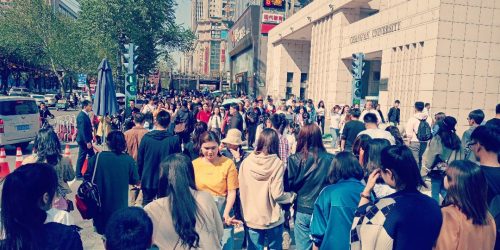
Just another day, out shopping. “People mountain, people sea.”
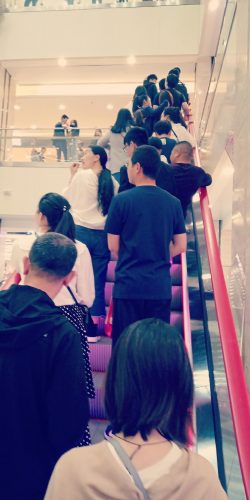
Riding an escalator in a mall. It’s not always this crowded but on weekends this is pretty typical.
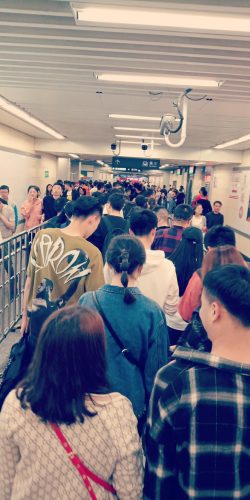
This the line to go through the security check-point.
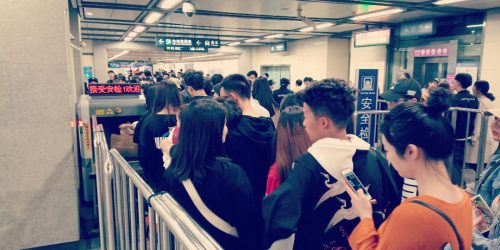
You can see the X-ray machine to put your personal belongings in. If you don’t, you will be stopped (along with everyone else) as the items are personally inspected.
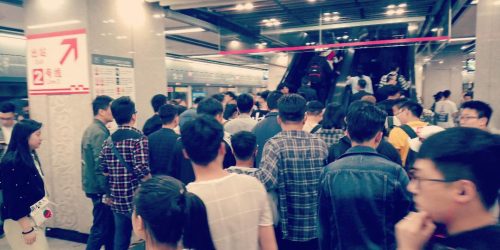
Upon exiting the subway train, very often this is what you have to endure to take the escalator (which you can see way up ahead in the background). Often there is a staircase and you can avoid the wait but here there is no stair option.
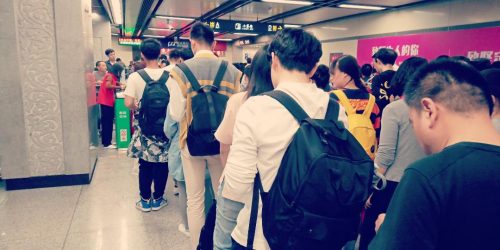
The line to exit the station. Notice the green turnstile scanner.
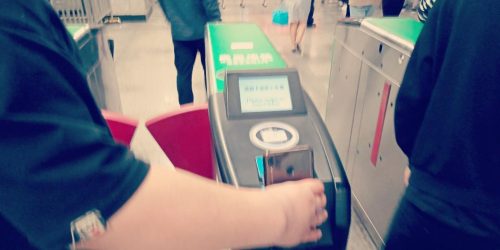
Here’s where things get exasperating, entering and upon leaving the subway. Many people scan their phone to pay. Oftentimes, it doesn’t work the first few tries and that “grinds my gears!”
